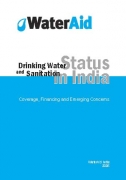 This paper by WaterAid India is an assessment of the drinking water and sanitation situation in the country in terms of coverage and financing gaps, if any, keeping the targets of the Millennium Development Goals as a benchmark for the assessment. It tries to highlight the emerging concerns and recommendations for public policy.
This paper by WaterAid India is an assessment of the drinking water and sanitation situation in the country in terms of coverage and financing gaps, if any, keeping the targets of the Millennium Development Goals as a benchmark for the assessment. It tries to highlight the emerging concerns and recommendations for public policy.
Rural water coverage as per the Department of Drinking Water Supply (DDWS) stands at 94 per cent of rural habitations in early 2004. This means that India is more than on course to meet the MDG target of 70.5 per cent of habitations ‘fully covered’ by 2015. Smaller studies have highlighted a large number of non-functional or unusable water sources, primarily a result of falling ground water levels leading to insufficient yield, increasing problems of water quality or poor maintenance leading to defunct infrastructure.
There is a difference between the number of habitations considered ‘fully covered’ and the number with coverage plus use plus sustainability. Huge financial resources have been earmarked for the rural drinking water sector in the Tenth Five-Year Plan even with 94 per cent of habitations considered fully covered. It is hard to understand that if officially 95 per cent of the rural population is fully covered with drinking water, what is the need to allocate massive outlays for the rest of the target population?
Effectiveness of government spending in rural drinking water is emerging as a major concern. Despite huge financial allocations committed under the Tenth Plan, it looks unlikely that India will reach the MDG targets for rural water and sanitation. There is still a lack of clarity about whether public monies are being spent in a pro poor and sustainable manner. The increasing financial outlays for the rural water sector in India do not reflect the true status on the ground. Rural drinking water sector financing in India is already a major political issue and will continue to be so in the years to come.
This desk review of the complex water and sanitation scenario of India, proposes the following major recommendations for public policy, programmes and renewed focus of all other stakeholders -
- Improving the quality, regularity and reliability of statistics of drinking water and sanitation
- Monitoring of water quality, access and affordability of drinking water should become a key consideration of national and state level agencies
- Effectiveness of public spending and realistic estimates of sector financing from a bottom up approach to assessment of finances for the sector
- Effective Policy, administrative and legal action needed to secure the sustainability of safe drinking water points
- Making a case for improved and equitable water and sanitation for urban poor